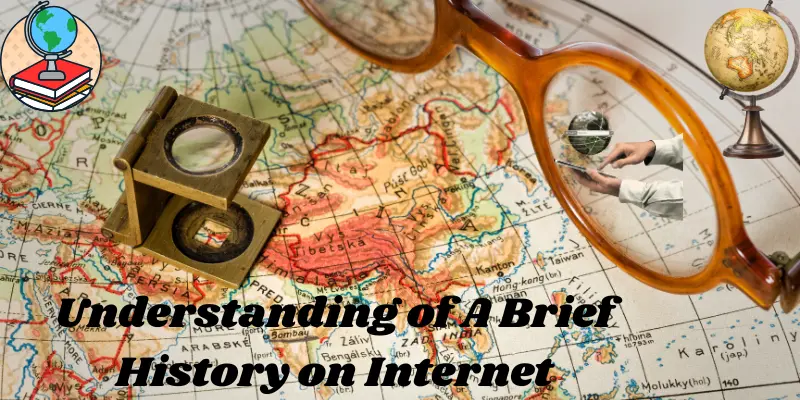A Brief History on Internet – The Evolution That Changed Us
Published: 26/03/2025
A Brief History on Internet, The internet is one of the greatest inventions in human history. It has changed the way people communicate, learn, and share information. Today, billions of people around the world use the internet for different purposes, such as education, business, and entertainment.
The internet was not created in a single day. It has a long history that started many years ago. In the beginning, it was developed for research and military purposes. Over time, it became available to the public, and now it connects the entire world. Understanding the history of the internet helps us see how it has evolved and how it continues to shape our lives.
Table of Contents
Understanding of A Brief History on Internet
The internet is an important part of our daily lives. It helps people send messages, find information, and connect with others around the world. But the internet was not always like this. It started as a small project and slowly grew into a global network.

In the early days, the internet was created for research and military use. Scientists wanted a way to share data quickly. Over time, new technologies made it better and easier to use. The invention of the World Wide Web helped bring the internet to homes, schools, and businesses. Today, billions of people use it for learning, working, and entertainment.
Understanding the history of the internet helps us see how it has changed and improved. From simple connections to high-speed networks, the internet continues to grow and make life easier for everyone.
Early Development of the Internet
The internet started as a small project many years ago. In the 1960s, scientists and engineers wanted a way to share information quickly. The United States government created a network called ARPANET. This was the first step toward the internet we use today.
In 1969, the first two computers were connected through ARPANET. This was an important moment in internet history. At that time, only a few people, like researchers and scientists, could use it. The purpose of this network was to send messages and share research data safely.
In the 1970s, new technology made the internet better. Scientists developed a system called TCP/IP, which helped computers communicate with each other easily. This was a big step in the development of the internet.
These early developments laid the foundation for the internet. Over time, it became more advanced and reached millions of people worldwide.
Growth and Expansion (1980s – 1990s)
- In the 1980s, the internet started to grow and improve. More computers were connected, and new technologies made communication faster. One of the biggest developments was the TCP/IP protocol, which allowed different networks to connect and share information easily. This helped the internet expand beyond research centers and reach universities and businesses.
- In 1989, a scientist named Tim Berners-Lee invented the World Wide Web (WWW). This was a major breakthrough because it made the internet easier to use. Before this, only experts could access the internet. But with the World Wide Web, people could visit websites and find information with just a few clicks.
- In the 1990s, the internet became available to the public. Many companies started creating websites, and email became a popular way to communicate. Search engines were developed to help people find information quickly. By the late 1990s, millions of people around the world were using the internet for education, business, and entertainment.
This period was important in internet history because it changed the way people lived and worked. The internet was no longer just for scientists—it became a tool for everyone.
Internet Evolution (2000s – Present)
In the 2000s, the internet became faster, smarter, and more powerful. New technologies like broadband and Wi-Fi allowed people to stay connected all the time. Websites became more advanced, and social media platforms like Facebook, Twitter, and YouTube changed the way people communicated.
As smartphones became popular, the internet moved from computers to mobile devices. Now, people could browse websites, send emails, and watch videos anytime, anywhere. Cloud computing also became an important part of the internet, making it easier to store and access data online.
In recent years, technologies like Artificial Intelligence (AI), the Internet of Things (IoT), and 5G have made the internet even better. AI helps improve search engines and online services, while IoT connects smart devices like home security cameras and voice assistants to the internet. 5G networks provide much faster internet speeds, allowing people to stream high-quality videos and play online games without any delay.
Today, billions of people use the internet for education, business, entertainment, and social interaction. As technology continues to improve, the internet will keep evolving and changing the way we live and work.
Future of the Internet
The internet is growing and changing every day. In the future, it will become even faster, smarter, and more powerful. New technologies like Artificial Intelligence (AI), Virtual Reality (VR), and 6G networks will make the internet more advanced. People will be able to experience things in new ways, like visiting virtual places and talking to AI-powered assistants.

With the help of the Internet of Things (IoT), more devices will be connected. Smart homes, self-driving cars, and intelligent cities will all use the internet to work better. People will control their homes, lights, and security systems with just their voices or smartphones.
Another big change will be better online security. As more people use the internet for banking, shopping, and work, strong cybersecurity will be needed to keep personal information safe. Scientists are working on ways to make the internet more secure from hackers and cyber threats.
In the future, even more people around the world will have internet access. Today, some areas still do not have a strong internet connection, but new projects will help bring fast internet to remote places. This will help students learn online and businesses grow globally.
The internet will continue to evolve and shape our daily lives. As technology improves, it will create new opportunities and make life easier for everyone.
Advantages and Disadvantages of the Internet
The internet has changed the world in many ways. It helps people learn, work, and stay connected. However, just like everything else, the internet has both advantages and disadvantages.
Benefits of the Internet
The internet helps people learn, work, and connect worldwide. It provides fast communication, online shopping, entertainment, and endless information.
| Pros |
|---|
|
Drawbacks of the Internet
The internet is useful, but it has drawbacks like cybercrime, fake news, addiction, and privacy risks. Safe use is important to avoid these problems.
| Cons |
|---|
|
Common FAQs About the Internet
Here are some frequently asked questions (FAQs) about the internet:
The internet started in 1969 with a project called ARPANET. It was created for research and military use before becoming available to the public.
Many scientists contributed to the internet’s development, but Leonard Kleinrock, Vinton Cerf, and Robert Kahn played important roles in creating its main systems.
The internet was first designed for research and military communication. Scientists wanted a way to share information quickly and safely.
The internet started with simple text-based communication. Over time, it evolved to include websites, images, videos, and social media. Today, it is used for education, business, and entertainment.
The internet is a global network that connects computers. The World Wide Web (WWW) is a part of the internet that allows users to visit websites using browsers like Chrome and Firefox.
The internet helps people communicate, learn, shop, work, and entertain themselves. It provides access to unlimited information and connects the world.
The internet is useful for learning, but it also has risks like fake news and harmful content. Parents should monitor children’s activity and use parental controls to keep them safe.
In the future, the internet will become faster and smarter with technologies like Artificial Intelligence (AI), Virtual Reality (VR), and 6G networks. More people worldwide will have access to it.
Conclusion
The internet is one of the most important inventions in history. It started as a small project for research and military use but has now become a big part of our daily lives. From education and business to communication and entertainment, the internet helps people in many ways.
Over the years, the internet has improved with new technologies like Wi-Fi, social media, and cloud computing. In the future, it will become even faster and smarter with Artificial Intelligence (AI), Virtual Reality (VR), and 6G networks.
While the internet has many advantages, it also has some risks like cybercrime, fake information, and privacy issues. To use the internet safely, people should be careful about their personal data and limit their screen time.
The internet will continue to grow and change the world. If used wisely, it can make life easier, more connected, and more exciting for everyone.

- Be Respectful
- Stay Relevant
- Stay Positive
- True Feedback
- Encourage Discussion
- Avoid Spamming
- No Fake News
- Don't Copy-Paste
- No Personal Attacks

- Be Respectful
- Stay Relevant
- Stay Positive
- True Feedback
- Encourage Discussion
- Avoid Spamming
- No Fake News
- Don't Copy-Paste
- No Personal Attacks





